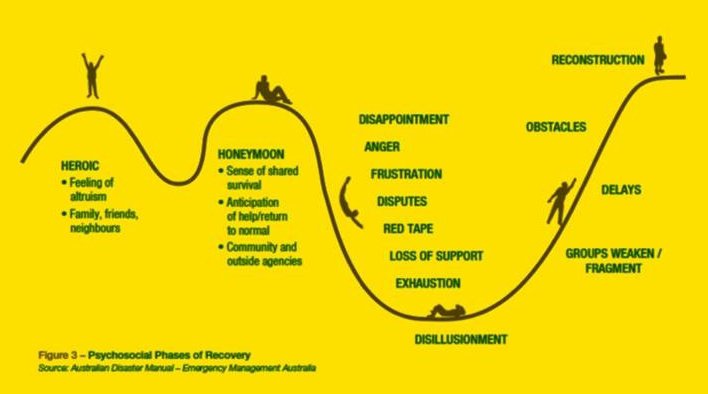Is Canterbury All Right? This is a complex question. Some of us are doing remarkably well, while others are struggling. For many of us, the response will be different depending on what day you ask!
Our research on Canterbury
In April 2017 All Right? released its latest survey on Cantabrians’ mental health as the region recovers from the earthquakes.
The research showed there has been some improvement in how people are feeling since the survey was first carried out in 2012:
- Fewer respondents reported that their current living conditions were getting them down (18% in 2016, 24% in 2012).
- More respondents reported that their life was better now than before the earthquakes (34% in 2016, 19% in 2012).
- There is a lot of hope and optimism in the region with 72% of those surveyed saying they feel lucky, 89% happy and 74% excited about the future.
It is also clear that the earthquakes and recovery related-stressors are still affecting Cantabrians’ wellbeing, with 64% of those surveyed still grieving for what we’ve lost.
The research also showed that unsettled insurance claims are having a negative impact on how people feel:
- More than a third of those with an unsettled claim say their living situation is currently getting them down – nearly three times as many as those with settled claims (11%).
- Almost half of those with an unsettled claim say they're struggling to deal with things that have happened as a result of the earthquakes, compared to people with settled claims (24%)
The research was carried out by Opinions Market Research in September 2016. It consisted of a survey of a representative sample of 800 randomly selected individuals, aged 15 years or older living in Christchurch and the Waimakariri and Selwyn Districts.
- Download the 2017 All Right? research summary
- Download the 2016 All Right? research summary
- Download the 2015 All Right? research summary
- Download the 2014 All Right? research summary
- Download the 2013 All Right? research summary
All Right? has also done research with specific populations and evaluations on different aspects of the campaign. Read the full reports and summaries below:
- 2019 All Right? Wellbeing in the Ōtautahi LGBTQIA+ community (Full report, and overview)
- 2018 All Right? investigation into Māori Resilience
- 2018 All Right? evaluation of the impact of All Right? campaign for tangata whaiora / mental health service users
- 2018 All Right? research on post-quake wellbeing in Kaikōura
- 2018 All Right? research on post-quake wellbeing in Hurunui
- 2017 All Right? evaluation of the social media component of the All Right?
- 2017 Workplace Wellbeing Research Summary
- 2015 All Right? Parenting Research Summary
- 2015 All Right? CALD Research Report
- 2013 All Right? Māori Research Report
- 2013 All Right? Pacific Research Report
- 2013 All Right? Youth Research Summary
Canterbury Wellbeing Index
For the latest research on how Canterbury is doing, please refer to The Canterbury Wellbeing Index. The index brings together high quality information about community wellbeing in Christchurch City, Selwyn, and Waimakariri Districts in an online format. As well as drawing from the data of many different local and national agencies, the index incorporates information from the annual Canterbury Wellbeing Survey.
How disasters affect mental health
Natural disasters like the Canterbury earthquakes have a major impact on people's mental health. In fact, international literature suggests that psychosocial recovery after a disaster can take five to ten years.
A key reason for this is that there's often a double blow – the shock and effects of the disaster itself, and then secondary, recovery-related issues such as dealing with broken homes, insurance claims, poor roading and the loss of community facilities.
These secondary issues – sometimes called 'manmade stressors' – can be worse than the disaster itself, particularly if the recovery is long, as they erode wellbeing over time.
